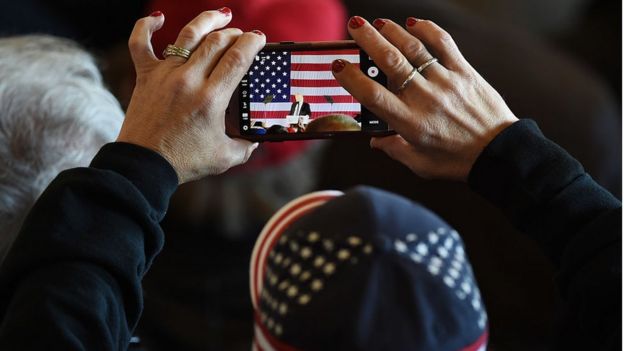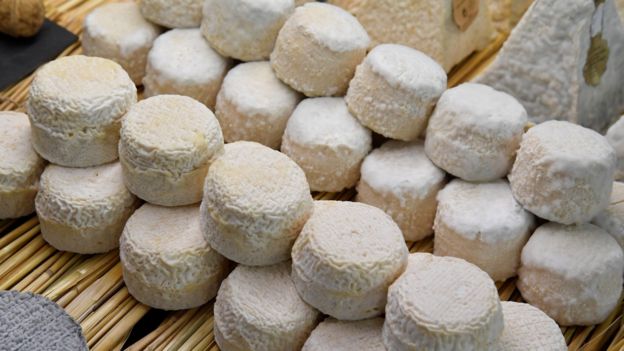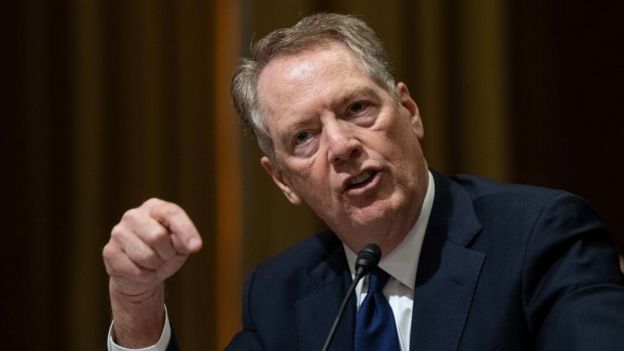
US President Donald Trump has set off a new bout of trade worries, firing tariff threats and hinting that a China deal may not happen for another year.
Speaking at a Nato summit on Tuesday, Mr Trump said he had "no deadline" for striking an agreement with Beijing.
The remarks suggested another round of China tariffs - due 15 December - might become reality, sending US shares to their largest losses in weeks.
It comes amid fresh trade disputes with France, Brazil and Argentina.
For more than a year the US and China have been locked in a bitter trade battle that has seen both sides impose tariffs on billions of dollars worth of each another's goods.
But while the uncertainty has dampened economic growth in the US and abroad, Mr Trump - a self-declared "Tariff Man" - has appeared content to let the spat roll on, despite the odd hint he might compromise.

Imported smartphones could cost Americans more if new tariffs go into effect
"It creates chaos and instability and he thrives on that in some ways," said Jennifer Hillman, a senior fellow at the Council on Foreign Relations and a former US trade official.
"The question being raised is, 'are we really trying to get to a solution with China or is this really all about raising tariffs?'"
Investors were cheered when Mr Trump seemed to drop a plan to hit European cars and car parts with import duties earlier this month.
There were also hopes that the US and China might strike a limited "phase one" deal to avert the 15 December round of tariffs, which will affect a wide range of consumer goods, including Apple products, clothing and Christmas lights.
But on Tuesday the president said he liked the idea of "waiting until after the election" to make a pact with Beijing, adding: "We'll see whether or not there's a deal. It's got to be right."

French cheese could be hit by US tariffs
The main US indices fell roughly 1% on the remarks, which were echoed by US Commerce Secretary Wilbur Ross on broadcaster CNBC.
"It's our job to try to get a proper deal done," Mr Ross said, though he added there is still a possibility that the president would suspend the looming tariffs.
The comments follow a series of other protectionist moves by the president this week.
On Monday, Mr Trump made a surprise announcement on Twitter that he would restore tariffs on Brazilian and Argentine steel and aluminium.
The office of the US Trade Representative on Monday also said it might increase the tariff rates on $7.5bn worth of European goods, already planned as punishment for Airbus subsidies.
And it announced it was readying higher import taxes on roughly $2.4bn worth of French goods, including Champagne and Roquefort cheese, in retaliation for a digital services tax.
Mr Trump's trade actions - some of which raise legal questions - ensure he remains the centre of attention, while diverting talk from more pressing political problems, Ms Hillman said.
The president is currently facing impeachment proceedings in the House of Representatives over claims he improperly sought help from Ukraine to boost his chances of re-election in 2020.
"I think he thinks it makes him look tough, it makes him look unconventional and it focuses all the attention on his actions," she said.
Whether Mr Trump's strategy will win politically remains to be seen.
Mr Trump's concerns about China are widely held in Washington, providing little political incentive for him to back down.

US Trade Representative Robert Lighthizer
And while the fights have hit farmers - a key constituency for Mr Trump - polls suggest their support remains resilient.
Michelle Erickson-Jones is a fourth-generation wheat farmer from Montana, who is working with Farmers for Free Trade, a lobby group that opposes tariffs.
She said farmers are aware of the monumental changes the Trump administration is trying to achieve with China and are focused instead on trying to secure other deals, like the US-Mexico-Canada Agreement, which the three countries completed last year but has yet to pass Congress.
"While we don't have time or much more patience with China, it's just the reality of what we're looking at," she said.